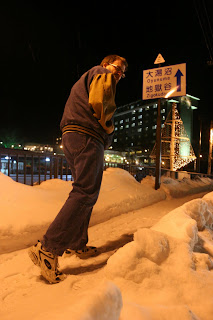So...
I, like, wrote a book.
It actually started out as a series of newspaper articles in a local paper in Shimane, but once my 100-article column was finished, we decided to collect the articles into a book.
I've made promises to quite a few people that, as the original book is in Japanese, I would translate the articles at some point in time.
Well...
No time like the present.
So here we go.
It's the Boonies! You Got a Problem With That?

Starting in October 1998, I studied at Shimane University in a year-long exchange program. A little bit before I was going to go back home, my
sensei told me, "There's a university magazine called Shimadai Tsushin, and I've been asked to find an exchange student to write an article for it. Would you be interested?" I was, so I wrote down my impressions of and feelings toward Shimane in an article. At that time, I had been reading a
manga called "Doctor Slump", and I was a big fan. One of my favorite parts was whenever the sun would come out, it would say, "It's morning! You got a problem with that?", so I decided to adapt that line to the title of my article. I'd like to introduce a bit of what I wrote in that article. It's from 1999, so there may be some strange phrasings, but please enjoy reading it.
When it was decided that I'd be coming to Japan on a year-long exchange, my friends in Tokyo all laughed at me and said, "Huh? Shimane? Man, that is way out in the boonies!" Hearing that, I pictured Matsue as a place where there was absolutely nothing. My hometown in America is out in the middle of nowhere, and there's nothing there, so I pictured myself having a very tough time in Middle-of-Nowhere, Japan. However, when I arrived in Matsue, I was amazed at how big the city was. Compared to my hometown, it wasn't "The Boonies" at all! The building were tall, there were lots of stores..."Man, I'm in the big city", I thought.
The month of October, in places other than Shimane, is known as "
Kannazuki", or "The Month of No Gods", but in Shimane, it's known as "
Kamiarizuki", or "The Month of The Gods". That's because all of the myriad deities from all over the country gather at Izumo Taisha in Shimane at that time. So when talking to my friends in Tokyo, I'd laugh right back at them and say, "You know all of your big-city gods? They're all out here now. Ha ha ha ha ha!" And it's not just
Kamiarizuki that's great about Shimane, either. Shimane is known as "The Land of Myths", and for me, who has been interested in mythology since I was little, this makes Shimane fascinating. The only original surviving castle in the entire San'in Region is located right here in Matsue. If shrines is your thing, there's Kamosu Shrine, Yaegaki Shrine, of course Izumo Taisha...just to name a few of the interesting shrines you can find in Shimane. Sometimes my friends tell me, "Man, you're a Shrine Freak," but the shrines in Shimane are peaceful and beautiful, and I really love going to them.
A representative characteristic of Shimane is that there is a lot of nature here. And yes, that does make Shimane a rural area, but that's not a bad thing. The ocean is clean, there are lots of mountains and forests, and it's a very relaxed placed, which is something else I like about living here. Plus, people in Shimane are very kind. Sometimes it's said that they are gloomy, but that just isn't the case. They will strike up conversations with you, help you find your way when you're lost, return a friendly greeting...that makes living here feel good.
So, why are the people in Shimane so kind? Why is there so much natural beauty here? Why are there so many historical buildings still standing in the area? There's just one reason. It's the boonies. You got a problem with that?
 The column is called "Kiddo Sensei no San-in Eigo Juku" or "Mr. Kidd's San-in English School", and it's a pretty cool deal.
The column is called "Kiddo Sensei no San-in Eigo Juku" or "Mr. Kidd's San-in English School", and it's a pretty cool deal. 










